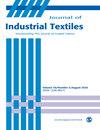蜂窝结构对流体传输和保温性能的影响;实现可伸缩编织的举措
IF 2
4区 工程技术
Q1 MATERIALS SCIENCE, TEXTILES
引用次数: 0
摘要
蜂窝编织组件的美观性和功能性使其有资格在家用纺织品、时装、功能性服装和技术产品等领域得到广泛应用。研究人员对蜂窝组件进行了探索,重点是通过蜂窝单元大小的变化分析其收缩、吸音、导热和防热性能。然而,通过采用不同的插纬顺序和材料(棉纱和弹力纱)来分析蜂巢编织物组件的热舒适特性的研究却少之又少。本研究反映了 12 种可拉伸蜂窝编织组件的导热性、干流体传输(透气性)、湿流体传输(湿度管理)和刚度属性,这些组件由单脊蜂窝、双脊蜂窝和明伦蜂窝编织结构组成,并采用了不同的棉纱和 400 型(T-400)可拉伸纱的纬纱序列。表征数据显示,单脊蜂窝结构具有最高的干燥流体传输性能,而亮贡蜂窝结构则具有最高的保温性能。双脊蜂窝结构具有最高的湿流体传输性能,而亮贡蜂窝结构则具有极高的刚度。统计分析(方差分析)还表明,蜂窝结构、纬纱顺序和材料对导热性和流体传输性能有显著影响,P 值小于 0.05。本文章由计算机程序翻译,如有差异,请以英文原文为准。
Influence of honeycomb structures on fluids transmission and heat retention properties; An initiative towards stretchable weaves
The aesthetics and functionality of honeycomb woven assemblies qualifies them for a range of applications expanding across home textiles, fashion, functional apparels, and technical products. Researchers have explored honeycomb assemblies with the focus on shrinkage, sound absorption, thermal conductivity, and heat protection properties analysis via variation in their cell sizes. However, very minimal research is found on analysis of honeycomb woven fabric assemblies’ thermal comfort characteristics by employing different weft insertion sequence and materials (cotton and stretchable yarns). This study reflects the thermal conductivity, dry fluid transmission (air permeability), wet fluid transmission (moisture management), and stiffness attributes of twelve stretchable honeycomb woven assemblies consisting of single ridge, double ridge, and brighton honeycomb weave structures along with different weft sequences of cotton and Type 400 (T-400) stretch yarns. Characterization data showed that single ridge honeycomb structure supports the highest dry fluid transmission property; however, brighton honeycomb offers the highest heat retention property. Double ridge honeycomb highlights the capability of the highest wet fluid transmission property, and brighton honeycomb has immense stiffness. Statistical analysis (ANOVA) also showed that honeycomb structures, weft yarn sequence and material have a statistically significant impact on thermal conductivity and fluid transmission behaviors with p-values less than 0.05.
求助全文
通过发布文献求助,成功后即可免费获取论文全文。
去求助
来源期刊

Journal of Industrial Textiles
MATERIALS SCIENCE, TEXTILES-
CiteScore
5.30
自引率
18.80%
发文量
165
审稿时长
2.3 months
期刊介绍:
The Journal of Industrial Textiles is the only peer reviewed journal devoted exclusively to technology, processing, methodology, modelling and applications in technical textiles, nonwovens, coated and laminated fabrics, textile composites and nanofibers.
 求助内容:
求助内容: 应助结果提醒方式:
应助结果提醒方式:


